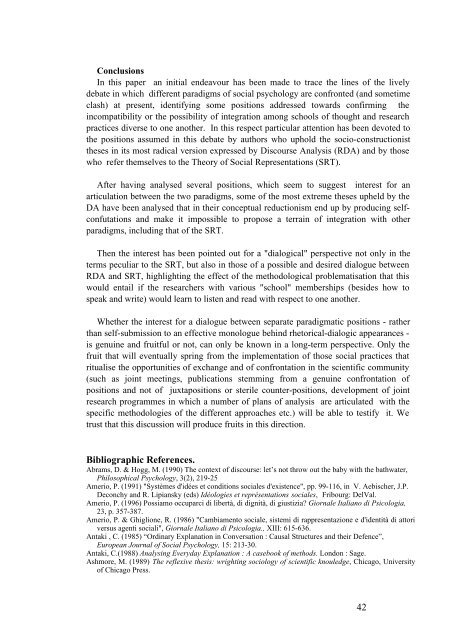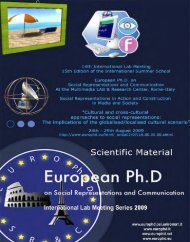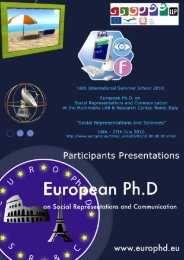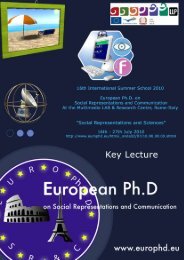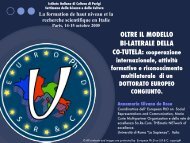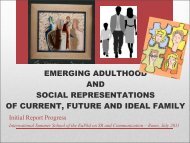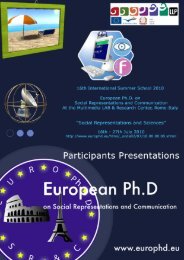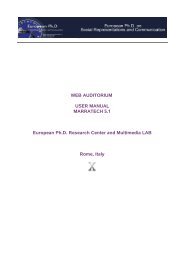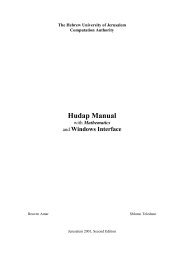The "boomerang" effect of the radicalism in discourse analysis
The "boomerang" effect of the radicalism in discourse analysis
The "boomerang" effect of the radicalism in discourse analysis
You also want an ePaper? Increase the reach of your titles
YUMPU automatically turns print PDFs into web optimized ePapers that Google loves.
Conclusions<br />
In this paper an <strong>in</strong>itial endeavour has been made to trace <strong>the</strong> l<strong>in</strong>es <strong>of</strong> <strong>the</strong> lively<br />
debate <strong>in</strong> which different paradigms <strong>of</strong> social psychology are confronted (and sometime<br />
clash) at present, identify<strong>in</strong>g some positions addressed towards confirm<strong>in</strong>g <strong>the</strong><br />
<strong>in</strong>compatibility or <strong>the</strong> possibility <strong>of</strong> <strong>in</strong>tegration among schools <strong>of</strong> thought and research<br />
practices diverse to one ano<strong>the</strong>r. In this respect particular attention has been devoted to<br />
<strong>the</strong> positions assumed <strong>in</strong> this debate by authors who uphold <strong>the</strong> socio-constructionist<br />
<strong>the</strong>ses <strong>in</strong> its most radical version expressed by Discourse Analysis (RDA) and by those<br />
who refer <strong>the</strong>mselves to <strong>the</strong> <strong>The</strong>ory <strong>of</strong> Social Representations (SRT).<br />
After hav<strong>in</strong>g analysed several positions, which seem to suggest <strong>in</strong>terest for an<br />
articulation between <strong>the</strong> two paradigms, some <strong>of</strong> <strong>the</strong> most extreme <strong>the</strong>ses upheld by <strong>the</strong><br />
DA have been analysed that <strong>in</strong> <strong>the</strong>ir conceptual reductionism end up by produc<strong>in</strong>g selfconfutations<br />
and make it impossible to propose a terra<strong>in</strong> <strong>of</strong> <strong>in</strong>tegration with o<strong>the</strong>r<br />
paradigms, <strong>in</strong>clud<strong>in</strong>g that <strong>of</strong> <strong>the</strong> SRT.<br />
<strong>The</strong>n <strong>the</strong> <strong>in</strong>terest has been po<strong>in</strong>ted out for a "dialogical" perspective not only <strong>in</strong> <strong>the</strong><br />
terms peculiar to <strong>the</strong> SRT, but also <strong>in</strong> those <strong>of</strong> a possible and desired dialogue between<br />
RDA and SRT, highlight<strong>in</strong>g <strong>the</strong> <strong>effect</strong> <strong>of</strong> <strong>the</strong> methodological problematisation that this<br />
would entail if <strong>the</strong> researchers with various "school" memberships (besides how to<br />
speak and write) would learn to listen and read with respect to one ano<strong>the</strong>r.<br />
Whe<strong>the</strong>r <strong>the</strong> <strong>in</strong>terest for a dialogue between separate paradigmatic positions - ra<strong>the</strong>r<br />
than self-submission to an <strong>effect</strong>ive monologue beh<strong>in</strong>d rhetorical-dialogic appearances -<br />
is genu<strong>in</strong>e and fruitful or not, can only be known <strong>in</strong> a long-term perspective. Only <strong>the</strong><br />
fruit that will eventually spr<strong>in</strong>g from <strong>the</strong> implementation <strong>of</strong> those social practices that<br />
ritualise <strong>the</strong> opportunities <strong>of</strong> exchange and <strong>of</strong> confrontation <strong>in</strong> <strong>the</strong> scientific community<br />
(such as jo<strong>in</strong>t meet<strong>in</strong>gs, publications stemm<strong>in</strong>g from a genu<strong>in</strong>e confrontation <strong>of</strong><br />
positions and not <strong>of</strong> juxtapositions or sterile counter-positions, development <strong>of</strong> jo<strong>in</strong>t<br />
research programmes <strong>in</strong> which a number <strong>of</strong> plans <strong>of</strong> <strong>analysis</strong> are articulated with <strong>the</strong><br />
specific methodologies <strong>of</strong> <strong>the</strong> different approaches etc.) will be able to testify it. We<br />
trust that this discussion will produce fruits <strong>in</strong> this direction.<br />
Bibliographic References.<br />
Abrams, D. & Hogg, M. (1990) <strong>The</strong> context <strong>of</strong> <strong>discourse</strong>: let’s not throw out <strong>the</strong> baby with <strong>the</strong> bathwater,<br />
Philosophical Psychology, 3(2), 219-25<br />
Amerio, P. (1991) "Systèmes d'idées et conditions sociales d'existence", pp. 99-116, <strong>in</strong> V. Aebischer, J.P.<br />
Deconchy and R. Lipiansky (eds) Idéologies et représentations sociales, Fribourg: DelVal.<br />
Amerio, P. (1996) Possiamo occuparci di libertà, di dignità, di giustizia? Giornale Italiano di Psicologia,<br />
23, p. 357-387.<br />
Amerio, P. & Ghiglione, R. (1986) "Cambiamento sociale, sistemi di rappresentazione e d'identità di attori<br />
versus agenti sociali", Giornale Italiano di Psicologia., XIII: 615-636.<br />
Antaki , C. (1985) “Ord<strong>in</strong>ary Explanation <strong>in</strong> Conversation : Causal Structures and <strong>the</strong>ir Defence”,<br />
European Journal <strong>of</strong> Social Psychology, 15: 213-30.<br />
Antaki, C.(1988) Analys<strong>in</strong>g Everyday Explanation : A casebook <strong>of</strong> methods. London : Sage.<br />
Ashmore, M. (1989) <strong>The</strong> reflexive <strong>the</strong>sis: wright<strong>in</strong>g sociology <strong>of</strong> scientific knouledge, Chicago, University<br />
<strong>of</strong> Chicago Press.<br />
42


